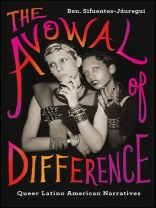The Avowal of Difference explores the potentialities and limitations that queer theory offers in the context of Latino American texts and subjects. Ben. Sifuentes-Jáuregui contrasts Latino American sexual genealogies with the Anglo-European ‘coming out’ narrative—and interrogates the centrality of the ‘coming out’ story as the regulating metaphor for gay, lesbian, or queer identities. In its place, the book looks at other strategies—from silence to circumlocution, from disavowal to indifference—to theorize queer subject formation in a Latino American cultural context. The analysis of texts by José Lezama Lima, Luis Zapata, Manuel Puig, Severo Sarduy, Junot Díaz, and others offers a comparative approach to understanding how queer sexualities are shaped and written in other cultural contexts.
Содержание
Acknowledgments
Introduction: Written Through a Body
Part 1. Unwriting the Self
1.
Modernismo, Masochism and Queer Potential in Nervo’s
El bachiller
2. Queer Losses in Barbachano Ponce’s
El diario de José Toledo
3. Adonis’s Silence: Textual Queerness in Zapata’s
El vampiro de la colonia Roma
Part 2. Interventions
4. Epistemerotics: Puig, Queer Subjects, and Writing Desire
5. La Manuela’s Return: Transvestism/Identifiction/the Abject in Lemebel’s
Loco afán
Part 3. The Body Politic
6. Homosexuality, Disavowal, and Pedagogy in Vargas Llosa’s
Los cachorros
7. Sadomasochism in
Paradiso: Bound Narratives and Pleasure
8. On the Homo-Baroque: Queering Sarduy’s Baroque Genealogies
Part 4. Queer Latina/o Narratives
9. Queer
Latinidad: Thomas’s
Down These Mean Streets and Díaz’s
Drown
10. Traveling North, Translating Queerness: Rivera-Valdés and the Trouble with Discipline
Notes
References
Index
Об авторе
Ben. Sifuentes-Jáuregui is Associate Professor of American Studies and Comparative Literature at Rutgers University. He is the author of
Transvestism, Masculinity, and Latin American Literature: Genders Share Flesh.












